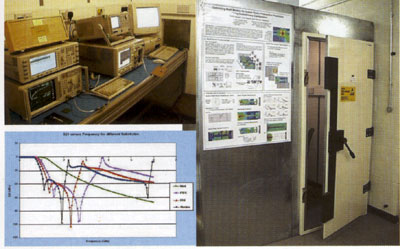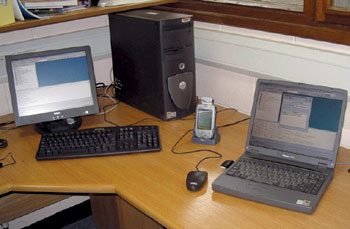| 2003 |

|
YEAR BOOK |
Cork Institute of Technology
|
Adaptive Wireless Systems Research at Cork Institute of Technology
|

The Adaptive Wireless Systems (AWS) Research Group at Cork Institute of Technology investigates and develops concepts for hardware, software and network & system design for adaptive wireless systems. This is both applied research in collaboration with industry, such as Motorola, Siemens, Vodafone, and Nortel Networks, and fundamental research in collaboration with Waterford IT and Trinity College Dublin. Research of the Adaptive Wireless Systems Group spans three main areas - hardware, software, and network and system design. Within these three areas, research is carried out along two streams, Mobile Communication Systems and Networks and Adaptive Wireless Systems and Ad-hoc Networks.
Hardware research focuses on the design of miniaturised wireless systems, ensuring a right-first-time design that satisfies user, technical and cost specifications in an environment where short time to market is vital. Within this overall focus, specific research areas include extracting electrical models of circuit boards and components using simulation and measurement to support design of high frequency systems, development of miniaturised wireless transceivers for use in sensor networks, and research towards developing new low power, miniaturised RF (Radio Frequency) front-end technologies suitable for use in indoor sensor networks. To support the hardware research, the group has a comprehensive set of simulation and measurement tools for electromagnetic, circuit, and system level design, while a shielded laboratory (see Figure 1) has been commissioned to allow computer controlled measurements using vector network analysis, time domain reflectrometry and spectrum analysis, as well as more general test equipment such as broadband function generators and oscilloscopes.

Research in network management focuses on information modelling for end-to-end quality of service management across heterogeneous wireless networks. A particular aspect of this is management of hardware and software configuration based on the software radio concept.
The group is involved in projects such as:
WMA (Wireless Multimedia Applications)
Wireless and Internet standardisation bodies are currently adopting the Session Initiation Protocol (SIP) for control and maintenance of wireless multimedia sessions within an Internet Protocol based framework. This project, in collaboration with Motorola and Waterford IT and funded by Enterprise Ireland, develops SIP protocol compression techniques and SIP based multimedia applications that together utilise an extensive set of the new capabilities provided by an Internet Protocol based 3G wireless network. Results from this research have been submitted to influence the SIP standardisation process within the Internet Engineering Task Force.
IST OPIUM ( www.ist-opium.org )
Research and development within the European Commission funded OPIUM project aims at supporting the rollout of commercial 3G services within Europe. The project validates the introduction of wireless based applications in Europe, based on a combination of new wireless systems and standardised open network/ service interfaces. This entails the implementation and demonstration of mobile accounting and novel advanced multimedia services based on industry standards within a Pan European network of interconnected 2.5G & 3G mobile networks.
HEA M-Zones ( www.m-zones.org )
M-Zones is a multi-disciplinary, inter-institutional research programme, funded under the Higher Education Authority (HEA) Programme for Research in Third Level Institutions, with partners Waterford IT, Cork IT, and Trinity College Dublin, engaged in fundamental research in Management and Control systems for integrated Multiple Smart Spaces. Smart Spaces are environments with traditional computing hardware, as well as embedded computers, information appliances, and multi-modal sensors, allowing people to perform tasks efficiently by offering unprecedented levels of access to information and assistance from computers.
Contact: Dr Dirk Pesch & Dr John Barrett, Adaptive Wireless Systems Group, Department of Electronic Engineering,
Cork Institute of Technology, Cork; E-mail: [email protected]; [email protected] ; Web: www.aws.cit.ie